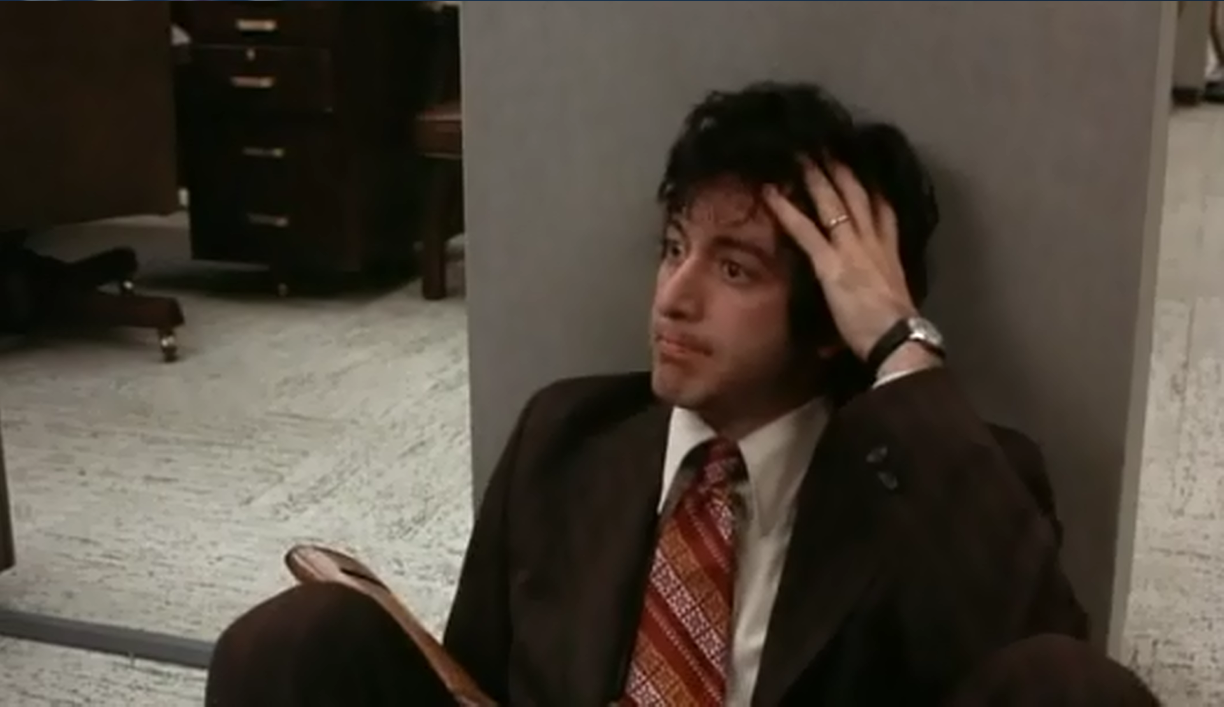
Directed by: Sidney Lumet
Starring: Al Pacino, John Cazale, Charles Durning, James Broderick, Susan Peretz, Chris Sarandon
Sonny Wortzik had it all wired. He would rob a Brooklyn bank and use some of the funds to pay for his male lover's sex-change operation. The robbery would take 10 minutes. In and out, no fuss and no way of getting caught. Nothing went right. One of Sonny's two accomplices flees the scene and they mistimed the robbery so the vault would only have $1,100 in it instead of several thousands. The crooks unintentionally draw attention to themselves and soon enough they are forced to take hostages as the police and a crowd of onlookers descend upon the bank.
Dog Day Afternoon is a film about inept crooks who are way in over their head. It's also about the media frenzy that is created by the incident. Sonny at first becomes a popular anti-hero to the crowd, but they turn on him when it is revealed that he is gay. Sonny desperately plots their escape, but he knows he has no hope for a getaway without being arrested or killed. His accomplice Sal (Cazale) has a stunned look of disbelief throughout the ordeal as he holds the hostages at bay with a rifle. He can't believe he is in this mess, but he is in it up to his eyeballs. Sal probably realized the cohort who fled had the right idea, especially when the news reports he is also gay, which disturbs him more than anything else. "Tell the news that I'm not gay," he pleads with Sonny, as if they don't have bigger fish to fry.
Pacino plays Sonny as a desperate man with big emotional needs and a screw loose. He doesn't want this mess and he doesn't want to hurt anyone. He announces he is Catholic when the robbery begins and is riddled with guilt and confusion as the hot day wears on. He also has an estranged wife and two children, but he loves Leon (Sarandon), whom he "married" in an unofficial ceremony and now is hospitalized after a suicide attempt. Leon loves Sonny, but can't deal with his mood swings. "I've spent the last six months trying to get away from you and now you're asking me to get on a plane with you," Leon tells Sonny in a phone conversation listened in on by the NYPD, FBI, and other authorities. Sonny's estranged wife Angie (Peretz) also tells police of his rage and unpredictable behavior. She also doesn't let Sonny (or anyone else) get a word in edgewise during conversations. She's in denial about her husband. "Sonny wouldn't do this. It may be his body, but it's not Sonny doing this."
Charles Durning and James Broderick play cops who want the situation to end without endangering the lives of the hostages. They acquiesce to Sonny's demands for a ride to the airport, a jet waiting to take them to "Algeria", and even a pizza delivery. The delivery man after screams in joy, "I'm a star!" to the crowd. I doubt Sonny or Sal even know where Algeria is, but it sounds exotic enough to them. Sal is afraid of flying, though, and when asked what country he would like to fly to, he replies, "Wyoming." Dog Day Afternoon works best when it allows humor to be peppered in during a long, hot ordeal. The movie also correctly depicts the media's role in "Breaking News" stories like this one. Misinformation is announced as fact. Nowadays, news channels freely report dubious "facts" during round-the-clock coverage of school shootings and other ghastly events. The media is more interested in being first with new information without bothering to check if the information is accurate. Anyone watching the recent Boston Marathon or Sandy Hook shooting on TV witnessed that.
Dog Day Afternoon is a forerunner to director Lumet's next film, Network (1976), which depicts TV as a business interested in grabbing viewers in any way possible, even exploiting a demented newscaster and then killing him off when the ratings plummet. Network expands what Dog Day Afternoon started. Why are the people cheering Sonny when they know he is a bank robber who is endangering lives? Because he screams "Attica" and that sound bite is all the crowd hears. They then hear that he is gay and they jeer him. Everything else, including the facts, is noise to them. The same could be said for the TV viewing audience as well.
The film grinds its way through the day and Sonny barely maintains what little, if any, sanity he has left. The film ends pretty much the only way it could and it teems with on-the mark portraits of desperate people who want a happy ending to something that couldn't possibly have one.
No comments:
Post a Comment